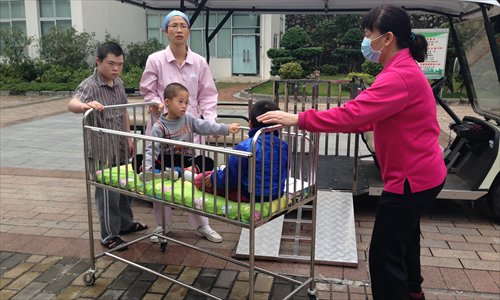Nowhere to abandon

Paramedic staff transfer abandoned babies from the "baby hatch" on February 26. Photo: CFP
Li Li (pseudonym) was 1-month-old when it became clear she suffered from a cleft palate and deformed legs.
After her parents, who are both migrant workers in Guangzhou, Guangdong Province, had spent all of their savings on medical treatment for the struggling baby, the father, surnamed Chen, decided he should leave his new-born daughter in the Guangzhou "baby hatch" - a controversial facility in which parents can leave children to be found by welfare centers.
However, days later, policemen found Chen and arrested him because the infant was found to have died before she was abandoned.
Chen was soon put into custody, and prosecutors are building a case against him over the crime of "abandonment of a child."
Li Li's death has drawn attention to the plight of abandoned children. According to statistics from the welfare house in Guangzhou, a total of 262 babies were abandoned in the baby hatch within two months.
Similarly, the safe island in Nanjing also received over 136 children within 88 days, equivalent to the overall number received last year by the Nanjing Welfare House which operates it.
The surging numbers of abandoned babies prompted Guangzhou authorities to close the baby hatch on March 16.
Xu Jiu has been working in a Guangzhou welfare center for over 20 years. As the director of the welfare center, he has seen plenty of people facing tough circumstances and he himself has been subject to intense stress.
But things had never been as bad as they are these days.
"I have refused all interview requests. I don't want to talk about it any more," Xu told the Global Times, nearly one month after the welfare house announced that it had suspended the facility.
Xu and his colleagues have been at the center of a storm of controversy after they closed the "safe island for babies," a place which many people praised as a facility to ensure the safety of abandoned children and enhance their chance to live. Before such facilities were established, many abandoned children were put on roadsides and the wilderness to die.
As abandoning babies is illegal in China, the scheme quickly caused public controversy after it was first introduced in Shijiazhuang, Hebei Province in 2011.
The rapidly increasing numbers of abandoned children have prompted public concerns over why such a large number of children have been abandoned and what remedial measures can be taken by the government and society to tackle the problem.
Experts point out that serious diseases and physical disabilities have become the most direct cause of the abandonment of children.

Caretakers transport the homeless children in the Guangzhou welfare house in late March. Photo: Liang Chen/GT
Unhealthy situation
A majority of the children discarded in Guangzhou had diseases or disabilities. Most of them were diagnosed with cerebral palsy, Down's syndrome or congenital heart disease.
"Most of the abandoned children were seriously-ill or handicapped, which was the main reason why people discarded their children," Xu Jiu, director of the Guangzhou welfare house, told the Global Times.
Xu said that the large migrant population and the prevalence of unprotected sex have both resulted in a large number of children being born out of wedlock and being abandoned. "Normally these children are abandoned by the poor and not yet mature parents," Xu said.
The current social welfare system has failed to offer these families any guarantees when it comes to seriously ill or handicapped babies, despite the fact the government has greatly boosted reimbursements of medical fees," Zhu Zhengfu, the deputy director of Guangdong Provincial Bar Association and a member of the Chinese People's Political Consultative Conference (CPPCC), who has been focusing on the issue of child abandonment, told the Global Times.
In developed Western countries, where social welfare or insurance can cover many of the medical expenses, families face fewer problems bringing up seriously ill babies, Zhu said.
Despite the fact that China is attempting to boost its healthcare infrastructure and funding assistance for major diseases, such as leukemia and congenital heart disease, the major disease insurance systems fail to cover all kinds of critical illnesses, which means children's medical fees remain a heavy burden.
Xu Liang, a volunteer who works with the NGO Tianshi Boda, offers assistance to new parents whose children are critically ill, helping them access obstetrics and gynecology hospitals in Guangzhou. He pointed out that the economic and mental stress caused by having children with health problems is often what pushes them to discard their children.
"One mother cried again and again after she found her daughter had a cleft palate, and she could never go to sleep afterwards. She had suffered a lot of mental pressure," Xu told the Global Times.
"One blood check-up can cost them one month's salary. How can they have money to pay for the children's medical fees?" Xu asked.

The safe haven established by the Guangzhou welfare house is cordoned off after being in operation for less than two months. Photo: Liang Chen/GT
Baby magnets
The better medical facilities and transport networks, as well as the large floating migrant population, have meant that larger cities act as a magnet pulling in parents who wish to abandon children with health defects.
"Due to the better medical facilities and convenient transportation, people tend to believe their children can be taken good care of if they are discarded in safe havens in economically-developed cities," Huang Peina, a publicity official from the Guangzhou social welfare center, told the Global Times, adding that this reduced their feelings of guilt.
Many parents from other cities or provinces discarded their children in the Guangzhou safe island, Huang pointed out.
Even after the safe haven was shut down by the local authorities, many people from other cities and provinces continued coming to abandon their children. Some of them even kneeled down and cried when their requests to discard the children were rejected.
But child welfare experts have pointed out that despite the government's attempt to at least provide abandoned children with a safe location to be abandoned, there are larger structural factors causing the problem.
One potential solution would be reinstating compulsory premarital health check-ups.
Certain serious diseases that may affect the child can be detected during pre-marital health check-ups, or tests during pregnancy. However, China revoked compulsory premarital check-ups in 2003, and the rate of birth defects has surged sharply since then.
It is estimated that at least over 800,000 to 1 million birth defects occur annually, representing 4 to 6 percent of the birth population, the Southern Metropolis reported.
In some well-developed areas, such as Guangzhou, the rate of birth defects is much higher.
Statistics from the Guangzhou family planning bureau in 2011 showed that birth defects in the Pearl River Delta reached 2.76 percent on average each year in the past decade, which was double the rate 10 years ago.
"There is a great need to reinstate compulsory premarital health checkups," said Wang Xianxin, deputy director of the committee of society and legislation at the CPPCC.
The broader public's medical knowledge remains limited, as do channels to help children, which means that poverty-stricken families have nowhere to seek help. NGOs are often either overwhelmed or unable to find the children.
"We have social resources to help those children, but I don't know how to find them," said Zhang Wen, the initiator of Children's Hope Foundation in Henan Province.
In fact, the Guangzhou civil affairs bureau noticed this problem a long time ago.
Guangzhou authorities now cooperate with some local NGOs, asking them to stay in maternity hospitals or to monitor baby hatches to check on the condition of the new-born babies and do follow-ups.
"If pre-rescue measures can be offered to the poverty-stricken families with seriously-ill children, many parents would not choose to abandon their children. After all, they're their own blood," volunteer Xu Liang told the Global Times.
Newspaper headline: Surge in birth defects overwhelms Guangzhou baby hatch